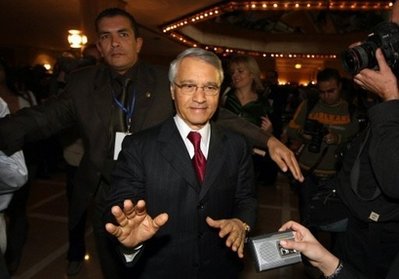Secretary General Abdullah El-Badri said compliance already was "100 percent" and OPEC President Chakib Khelil said in an official statement that members were "fulfilling their commitments."

OPEC president Chakib Khelil, seen here, said the cartel decided to leave its oil output quota unchanged and vowed to take any action necessary to balance the market next month. [Agencies]
|
Early industry estimates show Saudi Arabia and its Gulf neighbours making good their share of OPEC's 2 million bpd of cuts since September.
Petrologistics data estimated OPEC output falling by 1.22 million bpd in November, with nearly half of that reduction shouldered by Saudi.
OPEC may need to make larger cuts to balance the rapid decline in demand among Western economies that has caused inventories to swell. World oil demand is set to contract this year for the first time in 25 years.
"The bottom line is that they need to cut again and they need to cut substantially," said Gary Ross, CEO of consultancy PIRA Energy. "Demand is falling out from beneath them."
Naimi said he would like to see inventory cover among OECD industrialised nations down to 52 days from current levels of 55-56 days of forward demand, the top of the seasonal norm.
OPEC has a mixed record of dealing with downturns in the economy that curb energy demand.
In 2001 it successfully defended prices by removing 5 million bpd in four stages, 19 pct of its supply, laying the foundation for a 6-year boom in oil prices that culminated this summer in a record $147 a barrel.
But in 1997 in Jakarta, at the start of the Asian financial crisis, Saudi pushed through an OPEC increase after Venezuela openly flouted its cartel supply quota by a large margin.
Prices went into a tailspin and US crude hit a low of $10.35 at the end of 1998.

